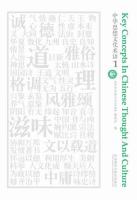Reflection
After reading the book on Chinese ideological and cultural terms, I am left with a profound sense of admiration and fascination for the depth and richness of Chinese thought. This book serves as a gateway to understanding the essence of Chinese culture, offering valuable insights into the timeless wisdom that has shaped China’s civilization over millennia.
The book meticulously introduces a wide array of key cultural terms, each carrying profound philosophical and historical significance. The concepts of “Ren” (benevolence), “Yi” (righteousness), “Li” (ritual propriety), “Zhi” (wisdom), and “Xin” (faithfulness) from Confucianism are explored in depth. These virtues form the cornerstone of Confucian philosophy, emphasizing moral cultivation, harmonious social relationships, and good governance. Through vivid examples and historical anecdotes, the book illustrates how these principles have guided personal conduct, family values, and social ethics in traditional Chinese society. It makes me realize the importance of moral integrity and the pursuit of harmony in building a cohesive and prosperous community.
Reading this book has not only expanded my knowledge of Chinese culture but also inspired me to reflect on my own values and beliefs. It has made me more aware of the universal nature of certain virtues and principles that transcend cultural boundaries. For instance, the pursuit of benevolence, righteousness, and wisdom is not unique to Chinese culture but can be found in various forms in other philosophical and religious traditions around the world. This realization reinforces the idea that despite our diverse cultural backgrounds, we share common aspirations for a better and more harmonious world.
Furthermore, the book deepens my understanding of the historical continuity and evolution of Chinese culture. The enduring influence of these ideological and cultural terms demonstrates how Chinese civilization has preserved its core values while adapting to changing times. It also highlights the resilience and vitality of Chinese thought, which continues to inspire and guide people in contemporary China.
In conclusion, this book on Chinese ideological and cultural terms is a thought-provoking and enlightening read. It offers a glimpse into the profound wisdom of Chinese culture, encouraging readers to explore and appreciate its philosophical treasures. For anyone interested in understanding China and its cultural heritage, this book is an invaluable resource that opens doors to a world of intellectual and spiritual richness. It has certainly deepened my admiration for Chinese culture and inspired me to continue learning and exploring the depths of its ideological and cultural heritage.



 京公网安备 11010802032529号
京公网安备 11010802032529号